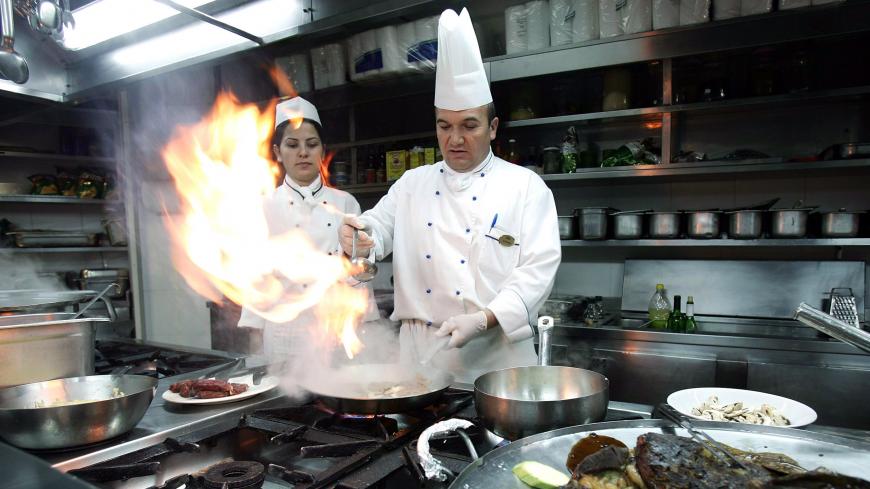For decades, Turkish tourism has leaned on the appeal of sea, sand and sun to attract Western tourists in search of cheap, all-inclusive holidays on beautiful beaches.
With Western tourism at a low point for the last three years due to terrorist attacks, the 2016 coup attempt and political crises with Western countries, leaders in the tourism industry and the government are exploring what can be done to reverse the sharp decline in Turkey’s tourism revenues.
The Tourism Council, made up of tourism executives, academics and government officials, met in Ankara Nov. 1-3, with the aim of drawing a road map for the future of tourism. The two-day meeting itself is newsworthy, as the council comes together for the third time after a lapse of 15 years. In a move to mark the importance of the event, the opening speech was made by President Recep Tayyip Erdogan himself, who drew attention to the need to diversify the tourism sector and to the role of gastronomy.
For the first time, the Tourism Council included a separate commission for gastronomy. One solid outcome was to create an umbrella gastronomy organization under the roof of the Ministry of Culture and Tourism to coordinate the various related studies, events, organizations, festivals and other activities.
Turkey’s hope that various Turkish cities known for their culinary culture might put Turkey back on the map got a boost when a Turkish city was recognized by UNESCO as a “creative city” of gastronomy for the second time in two years. Hatay, a southern province with a cuisine that combines a multi-ethnic gastronomic heritage, has been put on the UNESCO Creative Cities Network for gastronomy in November, following Gaziantep, its culinary twin, which was selected as a creative city of gastronomy in 2015.
The announcement was received with excitement in the Tourism Council’s gastronomy commission, as UNESCO recognition can bring food products and local produce to the attention of the world culinary scene and increases export potential. As both the cities recognized in Turkey are located in the same region, there has been talk of creating a culinary tourist route in southeastern Turkey. Both cities have borders with Syria and have hosted many refugees. Though national tourism is still lively, international tourism is ailing despite both cities’ rich heritage and impressive museums.
Turkey will host two more such conferences before the end of the year. On Dec. 2, the third International Gastromasa Gastronomy Conference will open in Istanbul, featuring 18 world-famous chefs from around the globe as speakers. The organizer, Gokmen Sozen of Sozen Productions, told Al-Monitor, “We aspire to bring Turkish products to the world culinary agenda. The world’s most famous chefs use Turkish ingredients, and this is why we chose Gaziantep as a featured city to display its amazing food products.” The conference's programming will also include field trips to Cappadocia and to several Istanbul restaurants and markets, where chefs will have a chance to taste, experience and learn about Turkish cuisine.
Meanwhile, the Aegean city of Izmir, with its herbs, liberal use of olive oil and recipes from Levantine and Sephardic cuisine, is another food destination. A member of the Delice network (a global network of gourmet cities) since 2015, the city will host the third International Gastronomic Tourism Congress Dec. 7-9.
Délice sees gastronomy as a key asset for the development of cities and strives to foster relationships between cities for the exchange of expertise and best practices. Sirma Guven, an instructor in the Culinary Arts and Management Department of Izmir University of Economics, told Al-Monitor, "The international contacts are very important for us. Many of our students have a chance to do an internship in Lyon, France, a culinary haven for young people to train in the hospitality sector.” Guven was among the team that founded the artichoke festival in Urla three years ago, a culinary fest that has now become a tradition that draws masses of people to taste the many dishes made with artichokes.
The true potential of gastronomy in Turkey is apparent among the young chefs who make names for themselves with international awards. Recently, young Mutlu Sevket Yilmaz of the small restaurant Seasons in Alanya, a major tourism destination on the Mediterranean coast of Turkey, won the national competition for the world’s most prestigious culinary trophy, Bocuse d’Or, for the second time. Dutch chef Rudolf van Nunen, the president of Bocuse d’Or Turkey and who has long resided in Turkey, told Al-Monitor, “Bocuse d’Or has very strict rules, and Mutlu is dedicated to following these rules. The competition also creates an opportunity to bring Turkish agricultural products to an international platform. When the pictures of the Turkish competition were put on the Instagram page of Bocuse d’Or, it was an immediate hit with 10,000 followers, way more than any other country. This is a great opportunity to have Turkey on the world’s culinary agenda.”








